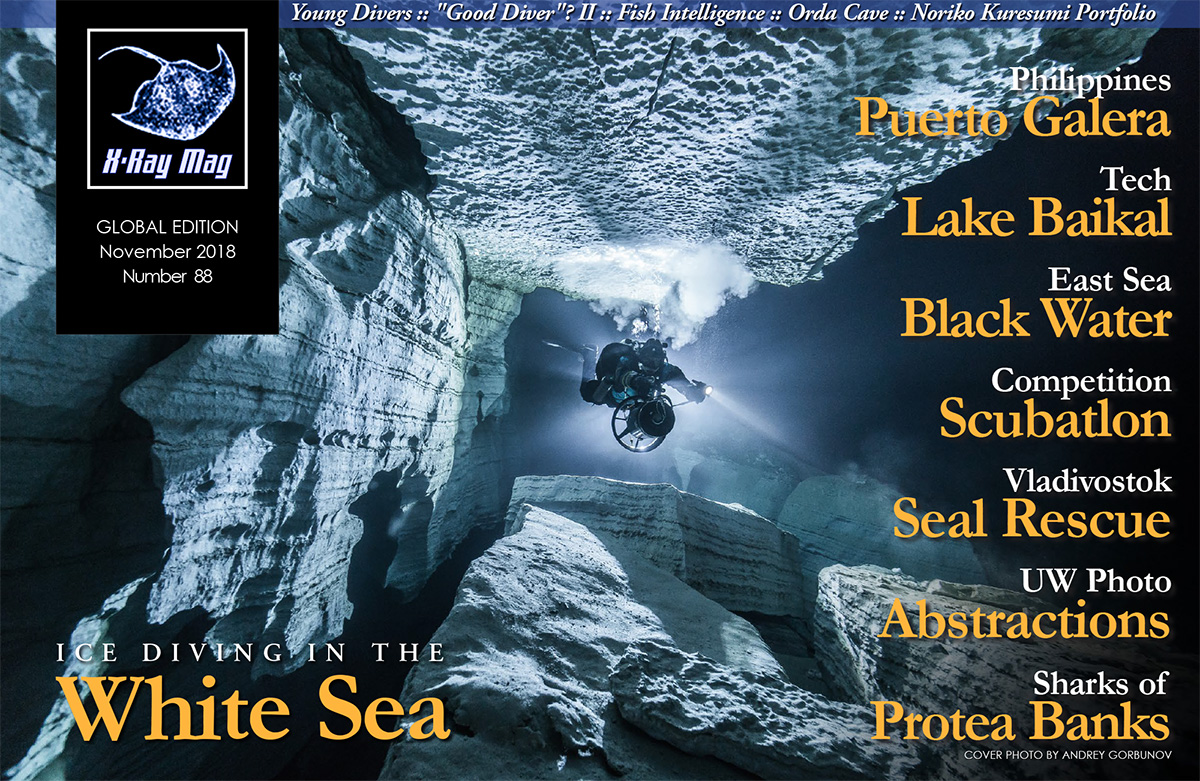
Young Divers
We are all born under the sun, and for the first year, we are perfectly at ease underwater. In the first months, we keep our eyes and mouths open without any problems, even underwater, thanks to the closure of the glottis that prevents us from drowning. After the first 10 to 12 months, however, we lose this superpower, and to go underwater, we have to organize well!
Contributed by
Diving is fantastic but also expensive and tiring. Perhaps this is the reason why the numbers of young people taking up diving seems to be decreasing in recent years. I think about the flurry of activity every time I have to prepare the equipment for myself, my wife Francesca, and now also for Lupo, our eight-year-old son.
Lupo has followed us on all our journeys since birth. At five months old, he was with us at Camel Dive Club & Hotel in Sharm el-Sheikh, Egypt. Since then, seeing air cylinders and dive equipment has been a normal thing for him. Then, he started to try them on a bit for fun, and eventually, he wanted to try diving five years later. Now, with his little 5-liter tank, which he can comfortably carry on his back, he dives a little bit “everywhere”—only at very limited depths, of course.
His enthusiasm repays us for all the effort of getting him equipped. But the most exciting thing to see is the relationship he has developed with the underwater world. Using all his five senses, he has gained a much deeper appreciation for nature and the Earth. He is attentive and obedient, and scrupulously performs the exercises, giving me full confidence in his safety underwater, even while I am aware that he is no longer in an environment that is natural for people. When he looks at me with his radiant and excited eyes, I am repaid for everything. If, for us adults, seeing an octopus is beautiful, for him, it is a new adventure, with exaltation when the octopus sprays its ink to get away.
The movements of children underwater are fluid and natural, much more loose than those of adults. Kids’ amazement is as great for a sea urchin as it is for a manta ray or a chestnut tree. The absence of gravity, or weightlessness, is a new discovery that makes kids feel a bit like “superheroes.” And so, Lupo strikes a thousand different action-figure poses in front of my camera, floating in the blue without any discomfort.
Not all children are interested in getting into the water, which is a pity because even their parents are missing something unique.
The approach to diving for children must be a gradual and natural one, without excessive pressure to prevent young people from getting turned off by this activity—the opposite of the desired effect. Swimming is certainly useful for improving the aquatic skills of young people and can easily be practiced all year round. Basic knowledge of marine biology can be imparted at every opportunity to direct young people towards a love and respect for nature.
Generation Z is ready to dive—it's up to us adults to help make their first dives a success!
Interview with Lupo Daturi, my eight-year-old son
I am lucky to have a sporty and very active son who follows me in many things. Among these are my forays into the underwater realm, despite his young age. His entry into diving was not a difficult stretch, but a natural step after watching me and other adults diving. Needless to say, we never take any risks with Lupo; we stop at safe quotas in terms of depth and duration, and we are always very close in proximity with him.
Marco: Lupo, do you like going underwater?
Lupo: A lot.
Marco: What do you like most?
Lupo: I always like to see different things—things that are never seen on the surface.
Marco: And what do you like least?
Lupo: Having a tank with little air!
Marco: Are you afraid underwater?
Lupo: Not at all.
Marco: Where would you like to go diving?
Lupo: I would like to return to the Maldives and also to Sharm.
Marco: Your most beautiful dive?
Lupo: Portiglione, Levanto—40 minutes of diving with lots of fish.
Marco: Do you like to keep your logbook?
Lupo: Yes, because then I remember all the dives.
Marco: What was the most beautiful fish you have seen underwater?
Lupo: The whale shark and manta rays.
Marco: Would you like to visit a shipwreck?
Lupo: A lot, but I cannot go because nobody will let me do it…
Marco: What would you like to say to your dive friends?
Lupo: Recommend your favorite dives to me, because I want to do them all!
Benefits
Why does diving do something more for our children than football or other sports? Children who practicediving develop greater resilience and dynamic skills than their peers who do not. While we wait for science to prove this one day (hopefully), we can observe it every day in people who dive—they are more enterprising, autonomous, organized and better able to adapt to situations, despite risks and adversities. This does not mean that they can still play football and practice other sports.
Just like the grown-ups, young divers have a lot of equipment they need to take care of, and so many important rules to learn and respect. For kids too, diving means overcoming many fears and challenges within an environment that is unnatural for human beings—at least until we humans learn to breathe water. There are few other sports in which contact with nature is so total; when underwater, the scenery changes and you enter a new world to explore.
10 good reasons why children should dive
Sub-aqua children learn:
1. to respect the rules
2. to be autonomous while with others
3. to organize and plan well
4. to manage and overcome their fears
5. to overcome challenges
6. to love and respect nature
7. to take care of their partners
8. to keep their equipment in order
9. to have fun at sea and in company
10. to stay in a group
Diving equipment for kids
Nowadays, almost all the major manufacturers of dive equipment have developed individual products, and in some cases, a complete line for children. While very similar to that of adults, this equipment differs in the details, from small mouthpieces to greater simplicity of use in the BCDs.
Recently, we had the opportunity to test the Rebel line by Scubapro, specially designed for young people. What was very interesting about the Scubapro Rebel was its flexibility, thanks to additional fittings and clips in different positions, which allowed you to have different sizes, and therefore, one could keep the product for several years while accommodating growth spurts in kids. Even the 5mm Rebel wetsuit by Scubapro has innovative features, which make it easier to don using zippers at ankles and neck, in addition to the back zip.
Dive training for kids
To start well, it is important to find a good instructor who teaches kids to love diving, entertaining them but also paying the utmost attention to safety, helping children overcome the difficulties of the sport.
Interview with Massimo Zarafa, PADI Regional Manager
— professional diver and pillar of the PADI community in Italy
Marco: Ciao Massimo. At what age did you approach scuba diving?
Massimo: At the age of 12, I obtained my first certification—PADI Junior Open Water Diver. I was swimming at a competitive level, and my father, Enzo, was one of the first PADI dive instructors in Italy. So, given this situation, it was inevitable that I would become passionate about diving! At the time, it was very rare to see children going underwater (we are talking about 1982). But today, it is quite another thing. Luckily, the culture has changed dramatically, and there are PADI programs to bring young people closer to diving.
The general feeling is that there are few young divers, that scuba diving is more a sport for “adults.” Is this true? In reality, it is absolutely not an activity only for adults. Indeed, the fact is that there are now many dive centers and therefore job opportunities in Italy, and throughout the world; I would say that diving is really for everyone. Sometimes, you can find yourself in groups or clubs where the average age is higher than in other sports and recreational activities. In these cases, it means that we have not been good enough in conveying to the young, the feelings that a diver can experience underwater, and the fact that we can turn a passion into the most beautiful profession in the world.
Marco: If there has been a decline, is PADI coming back to focusing on training young divers?
Massimo: I would say yes. At PADI, we carry out various initiatives to bring young people closer to diving. For example, the Amare School Project, which was created together with Project AWARE and which is recognized by MIUR (Ministry of Education, University and Research), has led us to conducting economics lessons related to the environment at Italian universities.
Marco: What programs does PADI have for children?
Massimo: We have the PADI Bubblemaker program, which allows children as young as eight years old to start “to make bubbles” in the pool. Then, for children 10 years old and up, it is possible to access the PADI Discover Scuba Diving program (which is a mini-course without certification) or the Junior Scuba Diver and Junior Open Water Diver courses (entry-level diver certifications that allow children limited diving if accompanied by a PADI professional or certified guardian).
Marco: The secret to passionate young divers?
Massimo: Approaching students from all schools, as PADI has been doing for years and not only in Italy. Beyond that, raising awareness among young people to become divers, to have fun but also to feel what it is like to be a sort of “PADI ambassador for the protection of the oceans.”
Marco: Tell us your message to the Z generation (born 1996–2010)!
Massimo: To Generation Z, I say: We must save the world from plastic and all the worst forms of pollution. But first of all, we must understand more deeply what the sea is and what lives there, and what we absolutely need to do to protect it.
Moreover, it is not easy to find a job these days. Diving offers many possibilities in Italy, and throughout the world. If one considers all this, starting a PADI course is a must for those who wish to pursue their passion, environmental awareness, and job opportunities. And then do as my children have: One already has a PADI Junior Open Water Diver certification and the other is already a PADI Rescue Diver. The underwater world needs you, and you will see that you will then need to dive all the time! ■





























